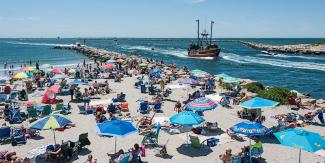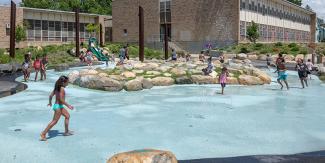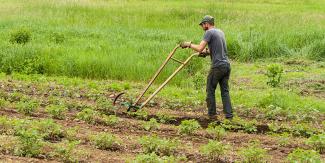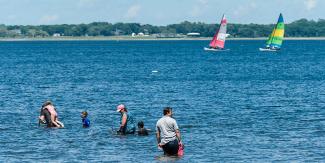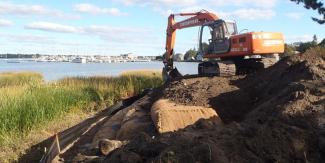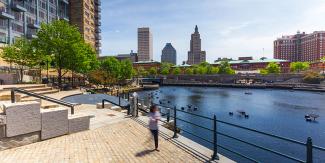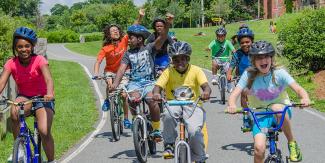2021 Beach, Clean Water & Green Economy Bond
Beach, Clean Water and Green Bond Approved with 78.3% Support!
On Tuesday, March 2, 2021, Rhode Island voters approved the Beach, Clean Water and Green Bond with an astounding 78.3% support. Voters across the state supported the $74 million bond question, with all 39 cities and towns posting returns of at least 60% in support. (View election results.) The message is loud and clear: Rhode Islanders care deeply about the quality of the environment. The funding provided by this bond will leverage tens of millions of additional dollars that will be invested in cleaning our water, improving public health and the resilience of our communities, and creating more inviting beaches, parks and campgrounds for the enjoyment of all Rhode Islanders. This is an historic opportunity for our State Park System!
The value of Rhode Island’s network of beaches and parks, green spaces, and waterways goes beyond beautiful places and recreational opportunities for public enjoyment. This network is important to the state’s economy and ability to attract people and businesses. The health of Narragansett Bay and our local waters is central to our environment, way of life, and economy in Rhode Island. Each year, our state beaches and parks delight millions of visitors and generate jobs and revenue that support state and local economies, while our farms support the continued growth of our vibrant food sector. This proposed bond invests in our state beaches and parks, outdoor recreation, farmland and forested land, water quality, and community resilience.
STATE BEACHES, PARKS & CAMPGROUNDS: $33 MILLION investment for major capital improvements to state beaches, parks, and campgrounds. Improvements will likely include new or upgraded facilities at Goddard Memorial State Park, Roger Wheeler State Beach, Scarborough State Beach, Misquamicut State Beach, Colt State Park, Brenton State Park, and state campgrounds. Rhode Island’s state park network attracts upwards of nine million visitors each year and hosts high-profile national and international events such as Newport Folk and Jazz Festivals. They also are an important contributor to the state’s economy and ability to attract new people and businesses to Rhode Island. Each year, our parks contribute an estimated $312 million of economic output and support over 3,700 jobs.
DEVELOPMENT OF PARK ON FORMER I-195 LAND: $4 MILLION investment for park infrastructure development of a nearly 7-acre park on both sides of the Providence River connected by a pedestrian bridge that opened in 2019. Funds will be used to construct park infrastructure to enhance utilities, support park operations and programming, and enable food and beverage service.
LOCAL RECREATION: $4 MILLION in matching grants to create new and improve existing community parks and recreation facilities. Studies show access to green space improves health, promotes stronger social ties, and enhances neighborhood satisfaction and pride. Previous grant rounds received requests totaling twice the available funds. Since the inception of the program in 1988, DEM has awarded 519 grants totaling $73 million in investments in all 39 of RI’s cities and towns.
NATURAL & WORKING LANDS: $3 MILLION to conserve forested land and farmland. This program will protect farmland, enabling farmers to stay in business and keeping land productive – which supports our local food system and provides jobs. Since 2010, RI has leveraged nearly 75% partner funding on farmland projects. This program will also protect forested lands and the associated economic and ecosystem benefits. Rhode Island forests provide significant air quality benefits to the state, play an important role in keeping Rhode Island’s waterways safe and clean, and sequester 500,000 metric tons of carbon dioxide from the atmosphere each year. In addition, Rhode Island’s forest-based recreation economy generates approximately $375 million annually.
CLEAN WATER & DRINKING WATER: $15 MILLION in matching funds for the Clean and Drinking Water State Revolving Funds to ensure our drinking and recreational waters – including Narragansett Bay – are clean and safe. Matching funds will unlock close to $75 million in federal funds and an additional $175-$250 million in private sector capital. This infusion will create jobs and support a variety of projects including drinking water and wastewater treatment upgrades, stormwater quality improvements, combined sewer overflow abatement projects, water distribution system upgrades, and repairs to aging sewers.
MUNICIPAL RESILIENCE PROGRAM: $7 MILLION to help local communities restore and improve resiliency of vulnerable coastal habitats, river and stream floodplains, and infrastructure. This investment will fund matching grants up to 75% to directly support Rhode Island’s cities and towns to identify top hazards, improve community resiliency, and strengthen public safety in the face of increased flooding and more frequent and more intense storm events driven by climate change. The Municipal Resilience Program has already been successful in identifying strategies and providing action grants to implement projects in five communities. This funding will unlock additional resources for those communities and allow 20 additional municipalities to participate in the program over the next two years.
DREDGING OF PROVIDENCE RIVER: $6 MILLION for economic development, infrastructure maintenance, enhanced tourism opportunities, and improved water depths for boating, recreation, climate resiliency, and to ensure the viability of WaterFire.
WOONASQUATUCKET RIVER WATERSHED COUNCIL: $2 MILLION to develop, improve, and rehabilitate public recreational projects and infrastructure along the Woonasquatucket River and its Greenway, from North Smithfield and Glocester through Smithfield, North Providence, Johnston, and Providence.
PREVIOUS GREEN BONDS:
Quick Facts
- Green bonds support what we all love about Rhode Island — clean blue waters, green spaces, and vibrant communities. They help protect the environment, support economic development, enhance recreational opportunities and access, strengthen Rhode Island’s resiliency in the face of climate change, and improve our quality of life in many other ways.
- Over the past decade, nearly every community in the state has benefitted from a local recreation grant, an open space or farmland grant, or a water quality, resilience, on flooding grant. Funds from the 2018 green economy bond have been spent on: Preserving wildlife habitat; Protecting drinking water supplies; Ensuring public access to bike paths and hiking trails; Making our coasts and critical infrastructure more resilient, and; Cleaning up contaminated brownfield sites so that they can be returned to tax rolls, create jobs, and revitalize our neighborhoods.
- Every state dollar invested in open-space conservation is matched by at least $2 from other funding sources
- The value of Rhode Island’s network of bikeways, open spaces, and waterways goes beyond beautiful places and healthy options for public enjoyment. Visitors to state parks, beaches, bikeways, and campgrounds contribute substantially to our economy. A URI study found that in 2016, 9.6 million visitors to these facilities generated economic output of $313 million and 3,700 jobs. Visitors spent $89 million at restaurants and bars, $76 million at gas stations, $50 million at hotels and motels, and $47 million at grocery stores.
- Studies show access to greenspace improves health, promotes stronger social ties, and enhances neighborhood satisfaction and pride.
- Outdoor recreation in Rhode Island supports 24,000 jobs and contributes $2.4 billion annually to the economy.
- Since 2010, RI has leveraged nearly 75% partner funding on farmland projects.
- Rhode Island forests provide significant air quality benefits to the state, play an important role in keeping Rhode Island’s waterways safe and clean, and sequester 500,000 metric tons of carbon dioxide from the atmosphere each year.
- Forests are a place where humans and native wildlife can live and thrive by providing habitats for animals and livelihoods for humans. They also offer watershed protection, prevent soil erosion and mitigate climate change.
- Rhode Island’s forest and wood products sector generated nearly 2,500 jobs with $408 million in gross sales in 2016, while forest-based outdoor recreation contributes over $720 million annually to Rhode Island’s economy.
- Voter approval of prior green bonds has allowed Rhode Island to make historic progress cleaning up Narragansett Bay along with our rivers and coastal waters. Cleaner and healthier waters mean more beach days and expanded opportunities to harvest and enjoy delicious, wild shellfish.
- Since 2010, voter approved green bonds have capitalized the Narragansett Bay and Watershed Restoration Fund in 2012, 2014, and 2016. A total of 13 construction projects have been completed using funds from these bonds. A total of 135 construction related or engineering jobs have been directly funded.

